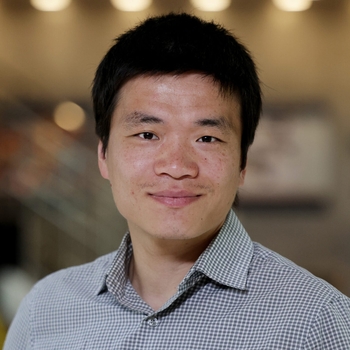Congratulations to Jiahe Li, Assistant Professor of Biomedical Engineering, who has received the National Institutes of Health (NIH) Director’s New Innovator Award from the NIH Common Fund’s High-Risk, High-Reward Research (HRHR) program.
The NIH Common Fund supports a series of exceptionally high-impact programs that cross NIH Institutes and Centers. Common Fund programs pursue major opportunities and gaps in biomedical research that require NIH-wide collaboration to succeed. The New Innovator Award, established in 2007, supports unusually innovative research from early career investigators who are within 10 years of their final degree or clinical residency and have not yet received a research project grant or equivalent NIH grant.
“I feel both humbled and encouraged by this honor, as it recognizes the exciting research my lab has been focusing on since I embarked on my tenure-track position at Northeastern University four years ago,” said Dr. Li. “We are well-positioned to pioneer a disruptive technology aimed at modulating the microbiome, aligning with the cutting-edge genome engineering technologies. This approach involves precisely targeting and deactivating harmful metabolites produced by pathogenic bacteria. Moreover, I am deeply grateful to U-M’s BME for affording me the opportunity to further our research, which is built upon the foundation of the proposed study. Our work stands to greatly benefit from the synergy between the Medical School and Michigan Engineering, and I am very much looking forward to the collaborative possibilities this environment will offer.”
In Dr. Li’s application for the grant, reviewers noted that his research has the potential for devising a number of therapeutics against colorectal cancers and many gut inflammatory diseases associated with the microbiome. “Blockade of a specific gut microbial metabolite has tremendous applicability potential to other deleterious microbial metabolites implicated in different diseases and thus vast translational opportunities,” according to the report. “The central focus of this application is to apply molecular technologies to eliminate colibactin, a product of the gut microbiome that is associated with genetic instability in epithelial cells, and development of pathology, including colon cancer. A major strength in the application is the creativity of the investigator, particularly in the utilization of horizontal gene-transfer to eliminate unwanted bacteria. If successful, the approach can be used to manipulate other bacterial metabolites in the gut microbiome. While the technologies are not innovative, their use in this particular problem is.”
Dr. Li earned his PhD in Biomedical Engineering at Cornell University with Dr. Michael King in 2015, where he leveraged synthetic biology approaches and cell biology to engineer bacteria and platelets as platforms to address cancer. Later, he performed postdoctoral training with Dr. Paula Hammond at MIT (2015-2018), where he gained new training in RNA chemistry and delivery. He was a tenure-track Assistant Professor in the Department of Bioengineering at Northeastern University from 2019 to 2023, where he received the NIBIB Trailblazer Award, CDMRP Idea Award, CDMRP Discovery Award and NSF CAREER Award. Dr. Li relocated the lab to the University of Michigan in the summer of 2023, and his research focuses on the development of molecular and live cell-based therapeutics to interrogate and manipulate interactions among therapeutics, the microbiome, and host.
The 85 awards (totaling approximately $187 million) are supported by the NIH Common Fund, as well as six other institutes, centers, and offices across NIH, beginning in 2023 for five years, pending the availability of funds.
“The HRHR program is a pillar for innovation here at NIH, providing support to transformational research, with advances in biomedical and behavioral science,” said Robert W. Eisinger, Ph.D., Acting Director of the Division of Program Coordination, Planning, and Strategic Initiatives, which oversees the NIH Common Fund. “These awards align with the Common Fund’s mandate to support science expected to have exceptionally high and broadly applicable impact.”
